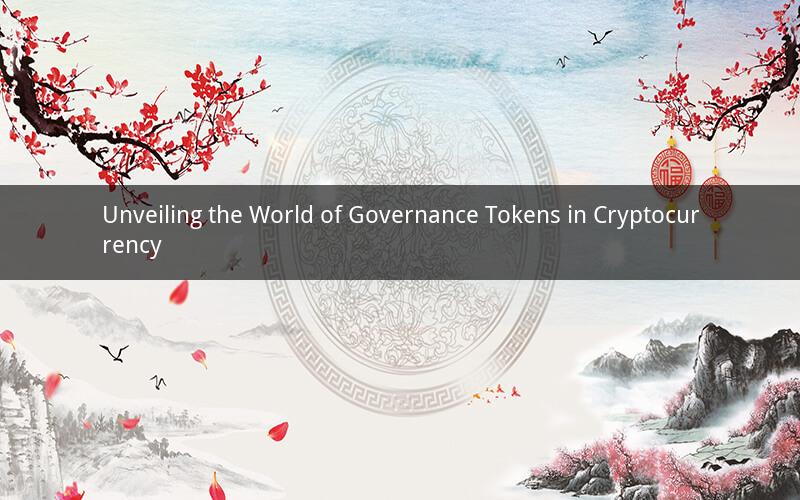
Governance tokens in the cryptocurrency realm have emerged as a revolutionary concept, reshaping the way blockchain networks operate. These digital assets empower token holders to participate in the decision-making process of their preferred blockchain platforms. This article delves into the intricacies of governance tokens, their significance, and the potential impact they hold for the future of cryptocurrency.
1. What is a Governance Token?
A governance token is a unique type of cryptocurrency token designed to grant token holders voting rights within a blockchain network. Unlike utility tokens, which are primarily used for accessing specific services or products, governance tokens focus on empowering users to influence the direction and future of the network. These tokens are typically distributed to early investors, participants, or developers of the blockchain platform.
2. How Do Governance Tokens Work?
Governance tokens operate through a decentralized autonomous organization (DAO) framework. DAOs are blockchain-based entities that operate without a central authority, allowing token holders to collectively make decisions regarding the network's development and operations. Token holders can vote on various proposals, such as introducing new features, modifying existing protocols, or allocating funds for development.
2.1 Token Distribution and Allocation
Token distribution is a crucial aspect of governance token implementation. Networks often follow a predetermined distribution strategy, which may include:
- Initial Coin Offering (ICO): Distributing tokens to early investors in exchange for fiat currency or other cryptocurrencies.
- Airdrop: Sending tokens to existing blockchain users or communities.
- Staking: Awarding tokens to users who lock their tokens in a smart contract to support the network's security.
- Pre-mining: Allocating a portion of tokens to the development team and early investors.
2.2 DAO Structure and Decision-Making
DAOs are designed to enable transparent and inclusive decision-making processes. Token holders can propose and vote on various aspects of the network, including:
- Protocol upgrades: Proposing changes to the network's underlying code and algorithms.
- Funding allocation: Deciding how to distribute funds for development, marketing, or other initiatives.
- Tokenomics: Adjusting token supply, distribution, and rewards structures.
3. The Significance of Governance Tokens
Governance tokens hold significant implications for the cryptocurrency ecosystem. Here are some key reasons why they are gaining popularity:
3.1 Decentralization
Governance tokens promote decentralization by eliminating the need for a central authority to make decisions on behalf of the network. This fosters a more democratic and inclusive ecosystem, allowing token holders to have a direct say in the network's future.
3.2 Transparency and Trust
DAOs and governance tokens provide a high level of transparency, as all decisions and transactions are recorded on the blockchain. This transparency helps build trust among users and reduces the risk of fraudulent activities.
3.3 Community Involvement
Governance tokens encourage community involvement, as token holders have a vested interest in the network's success. This can lead to increased participation in bug bounty programs, marketing efforts, and overall network growth.
4. Examples of Governance Tokens
Several notable blockchain platforms have implemented governance tokens, showcasing their potential impact. Here are a few examples:
- Ethereum (ETH): As the second-largest cryptocurrency by market capitalization, Ethereum's native token, ETH, allows token holders to participate in network upgrades and other governance decisions.
- Cardano (ADA): Cardano's native token, ADA, enables token holders to vote on various proposals, including protocol changes and funding allocation.
- Polkadot (DOT): Polkadot's native token, DOT, facilitates governance decisions, such as parachain slots allocation and relay chain upgrades.
- Uniswap (UNI): Uniswap's governance token, UNI, allows token holders to participate in the platform's development, including tokenomics and liquidity incentives.
5. Challenges and Considerations
While governance tokens offer numerous benefits, there are also challenges and considerations to keep in mind:
5.1 Security Risks
Governance tokens, like any other cryptocurrency, are vulnerable to security risks such as hacking, phishing, and other cyber threats. Ensuring the safety of token holders and the network is crucial.
5.2 Regulatory Challenges
Governance tokens may face regulatory hurdles, as governments around the world continue to grapple with the evolving cryptocurrency landscape. Compliance with applicable regulations is essential for the long-term success of governance token-based networks.
5.3 Centralization Risks
Despite the decentralized nature of governance tokens, there is a risk of centralization if a few token holders accumulate a significant portion of the total supply. Balancing power distribution among token holders is vital to maintain a democratic governance framework.
5.4 Market Volatility
Governance tokens, like all cryptocurrencies, are subject to market volatility. Fluctuations in the token's price can impact the network's stability and user confidence.
In conclusion, governance tokens have become a pivotal component of the cryptocurrency ecosystem, offering a new era of decentralized decision-making. As the blockchain industry continues to evolve, governance tokens have the potential to drive innovation, foster community involvement, and ensure the long-term success of blockchain networks. However, challenges such as security risks and regulatory hurdles must be addressed to realize the full potential of governance tokens.
Questions:
1. How does the distribution of governance tokens differ from the distribution of utility tokens?
2. Can governance tokens be used to influence the development of a blockchain network's core protocol?
3. What are the advantages and disadvantages of implementing a DAO for a cryptocurrency project?
4. How can token holders ensure their privacy while participating in a governance token system?
5. What steps can a blockchain project take to mitigate the risks associated with governance tokens?